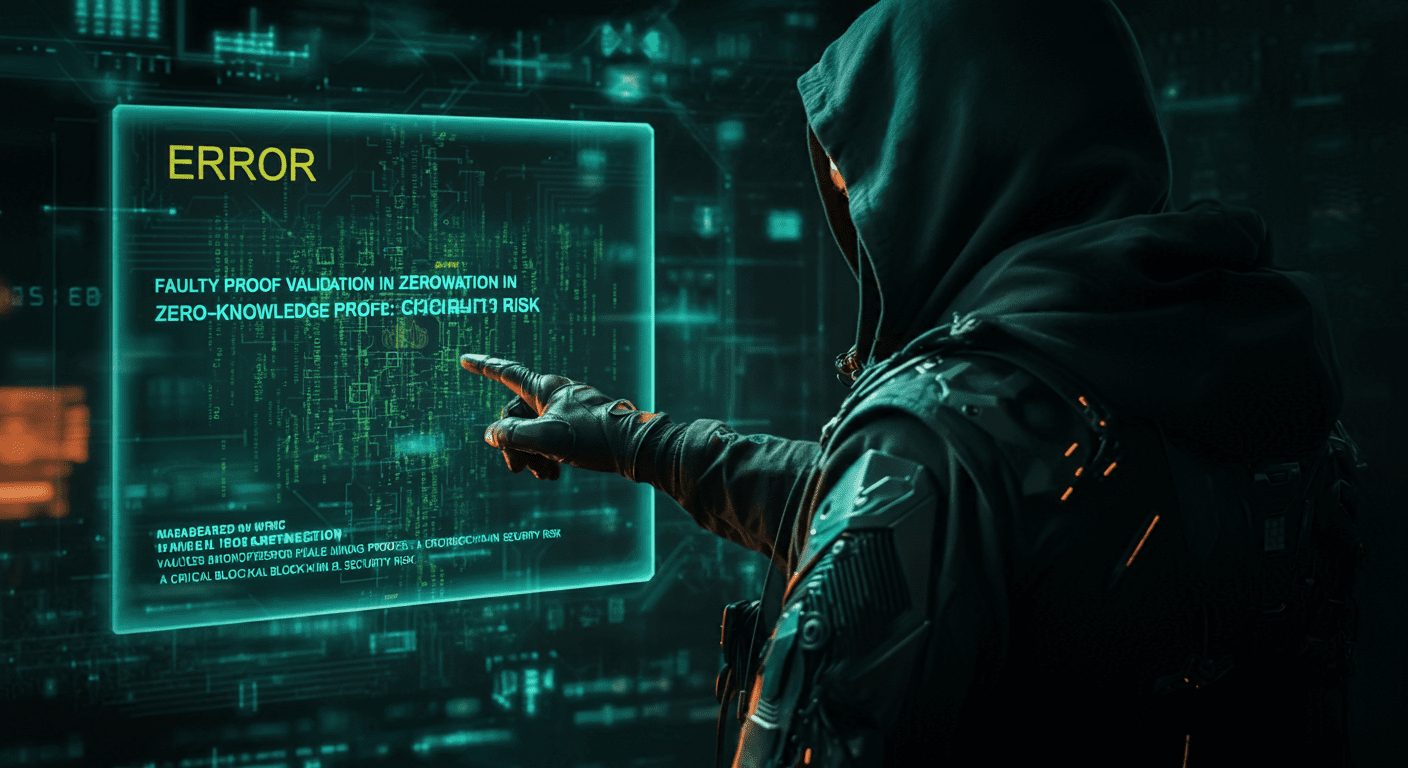Zero-Knowledge Proofs (ZKPs) are cryptographic methods that enable one party (the prover) to demonstrate the truth of a statement to another party (the verifier) without disclosing any further details about that statement. Although ZKPs provide significant advantages in terms of privacy and safety, they come with certain risks. A notable issue is faulty proof validation, which can compromise the system’s integrity. This article delves into ZKPs, the risks related to faulty proof validation, and the consequences for blockchain security.
Grasping Zero-Knowledge Proofs


Key Features of ZKPs
A zero-knowledge proof must meet three crucial criteria:
- Completeness: An honest prover can persuade an honest verifier of the statement’s truth if it is indeed true.
- Soundness: If the statement is false, no deceptive prover can convince an honest verifier about its truth, except with very low probability.
- Zero-Knowledge: If the statement is true, the verifier gains no additional knowledge, ensuring that sensitive information remains protected during the proof.
These characteristics make ZKPs valuable for applications that require privacy and verification, such as confirming identities, secure transactions, and confidential data sharing.
How ZKPs Work
ZKPs are categorized into two main types: interactive and non-interactive.
- Interactive ZKPs involve a dialogue between the prover and the verifier, where the verifier challenges the prover to prove knowledge of a secret without revealing it.
- Non-interactive ZKPs enable the prover to create a single proof that can be verified without additional communication.
Both types depend on advanced mathematical problems and cryptographic techniques to guarantee their security and effectiveness.
Risks of Faulty Proof Validation
What is Faulty Proof Validation?
Faulty proof validation occurs when a verifier incorrectly accepts a false statement as true due to issues in the ZKP protocol or its implementation. Several factors can contribute to this problem:
- Implementation Errors: Bugs or vulnerabilities in the software used to generate or verify ZKPs can result in incorrect validation.
- Algorithmic Weaknesses: Some cryptographic algorithms might possess inherent weaknesses that malicious actors could exploit to create false proofs that pass verification.
- Insufficient Testing: Lack of thorough testing on ZKP implementations may leave undetected flaws that jeopardize reliability.
Implications of Faulty Proof Validation
The consequences of faulty proof validation in ZKPs are significant, especially in blockchain contexts where trust and security are essential:
- Loss of Trust: Frequent faulty validations can erode user confidence in systems utilizing ZKPs, hindering their wider use.
- Financial Losses: Faulty validations in decentralized finance (DeFi) platforms that rely on ZKPs for transaction or identity verification could lead to unauthorized transactions or fraud, resulting in considerable financial repercussions.
- Regulatory Scrutiny: As blockchain technologies become more prevalent, regulators may impose stricter controls on systems using ZKPs if they frequently result in problems, potentially hindering innovation.
Strategies to Mitigate Validation Risks
To counter the risks tied to faulty proof validation in ZKPs, several approaches can be adopted:
- Robust Testing Protocols: Implement thorough testing frameworks to scrutinize ZKP implementations for vulnerabilities before they go live.
- Regular Audits: Conduct independent evaluations by third-party security experts to identify weaknesses within ZKP systems and ensure adherence to best practices.
- Algorithm Enhancement: Continued research into stronger cryptographic algorithms can bolster ZKPs against potential attacks or exploits.
- User Awareness: Informing users about the risks and limitations of ZKPs can empower them to make better decisions in systems that utilize these proofs.
Final Thoughts
Although zero-knowledge proofs are a revolutionary development in both cryptography and blockchain technology, the risk of faulty proof validation is a serious concern that must not be ignored. As more organizations adopt blockchain solutions with ZKPs for privacy and verification, addressing these vulnerabilities is imperative. By establishing rigorous testing procedures, performing regular audits, upgrading algorithms, and educating users on potential risks, stakeholders can enhance the trustworthiness of zero-knowledge proofs, ensuring they remain a fundamental component of secure digital interactions in the evolving realm of blockchain technology.



